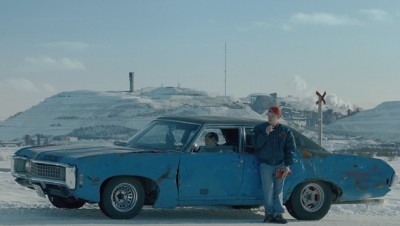When we decided to move to Kiruna there were many negative reactions from our friends, but the most negative of all were from people we knew in Stockholm. ‘What do you want to go there for? It’s just dark and there’s nothing there.’ What they also thought, but didn’t say, was, ‘and everyone works getting dirty in a mine and there’s no culture and it’s dead boring’.
It’s disappointing really, because the people who hold these views have generally never been here – usually no further north than Hudiksvall (a sort of ‘Watford gap’ point in Sweden, if you’re familiar with the idea). When we opened the bed and breakfast my English friends assumed our guests would all be Swedes, but Swedes rarely visit. They think it’s dark and there’s nothing of value here.
Unfortunately, prejudices further south in Sweden are frequently re-enforced by the recycling of stereotypes in newspapers and film, so it was with some nervousness last week I went to a showing of ‘Ömheten’ (or, ‘Broken Hill Blues’), a new film set in Kiruna.
The film maker, Alexandra Dahlström, is from Stockholm and lives in France. I heard her interviewed about the film, and I thought she showed an interest in Kiruna as a place, so I had hopes.
But what stereotypes were not present in this film? Let me see – it’s hard to think of any. Girls doing ballet and wearing frilly dresses, tick; boys playing around with cars, not being able to express themselves, tick; men working in the mine not being able to express themselves, except through physical violence, tick.

The stereotypes continue. Kiruna is a town of decaying flats where men with no future sit around drinking and trying to be manly. The youth feel they have no future and don’t want to go and work in the mine, which is the only option open for them. Women don’t appear in the film – obviously too busy cleaning the toilets. The girls work in, or spend their money in, the hairdressers, and look after children. Kiruna itself has a bad case of the shakes (obviously the result of excessive alcohol consumption), making glasses suddenly fall of shelves and smash like the fallout from the ghosts of Christmas past. Frustrated youths take out their anger on empty wooden buildings (setting fire to them) and are all apparently unable to hold a conversation. In the end one of them walks off silently into the ‘fjäll’ (in a singlet, in June – apparently a local who doesn’t know he’ll be eaten alive by mosquitoes) taking with him a shotgun and a very bitter expression. He shoots a reindeer, wallows in the mud, is rescued by girl fairies, and generally mans up a bit, before walking back to town.
I don’t recognise this Kiruna at all, but I recognise the stereotypes. At the end a young man goes to work in the mine by descending in a lift cage. Putting aside that there are no lifts in the mine in Kiruna, the suggestion that life down the mine is one of imprisonment in hard physical labour is a bit wide off the mark, given that for most people getting physical in the mine these days means manipulating a joy stick.
‘Tenderness’ is the translation of the film title. The film’s insight was that in this hard, macho town, some men still have a tender side. Well – who’d have thought it?

